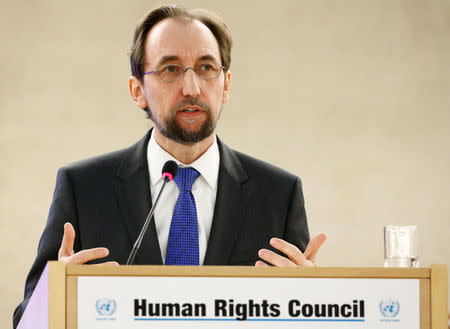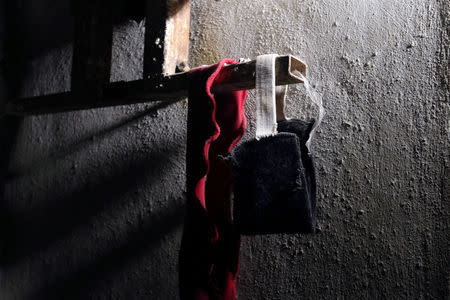Syria a 'torture-chamber', U.N. says in call to free detainees
By Stephanie Nebehay GENEVA (Reuters) - The top U.N. human rights official called on Tuesday for tens of thousands of detainees to be released from Syria's prisons and for torturers and executioners to be brought to justice as part of a lasting peace. Former Syrian detainees also testified before the U.N. Human Rights Council about their suffering and concern for men, women and children still in custody of the government or of extremist groups including al-Nusra and Islamic State. "Today in a sense the entire country has become a torture-chamber; a place of savage horror and absolute injustice," said U.N. High Commissioner for Human Rights Zeid Ra'ad al-Hussein. "Ensuring accountability, establishing the truth and providing reparations must happen if the Syrian people are ever to find reconciliation and peace," he told the Geneva forum, which met on the eve of the sixth anniversary of the first peaceful protests against Syrian President Bashar al-Assad. The Syrian government delegation did not attend but has denied allegations of systematic torture. The envoy from Russia, its main ally, called the event a "waste of valuable time". Noura Al-Ameer al-Jizawi, an activist and former detainee, cited the case of Syrian mother Ranya Abbasi and her six children, missing since their arrest in 2012, and also that of Rasha Shurbaji, who was freed last month with her children after four years in jail where she gave birth. "Many other women are detained with their children, detained in places not even fit for animals, let alone fit for children," she told the council. "CRIME AGAINST HUMANITY" Paulo Pinheiro, chairman of the U.N. Commission of Inquiry, noted that its 2016 report found that the scale of deaths in prisons indicated that the Assad government was responsible for "extermination as a crime against humanity". "Too many voices have been silenced by enforced disappearance, arbitrary detention, or death," he said. Zeid and Pinheiro pledged support to a new U.N. mechanism which will collect evidence and prepare criminal files for prosecution by national authorities or an international court. The government detains 87 percent of those in custody, or 92,000 of the total 106,000, said Fadel Abdul Ghani, executive director of the Syrian Network for Human Rights. Many suffer "horrendous acts of torture", he said. "We don't believe that Russia and Iran are paying the price for their support for such a regime that has committed war crimes," Abdul Ghani told a news briefing. Mazen Darwish, a lawyer freed in 2015 after three years in jail, voiced outrage at the lack of international action. "We are speaking of a daily massacre going on for six years," he told the 47-member forum. "All parties feel impunity so they continue these kinds of crimes daily without any feeling there will be consequences." (This story corrects date of U.N. report to 2016 in eighth para) (Editing by Gareth Jones)




